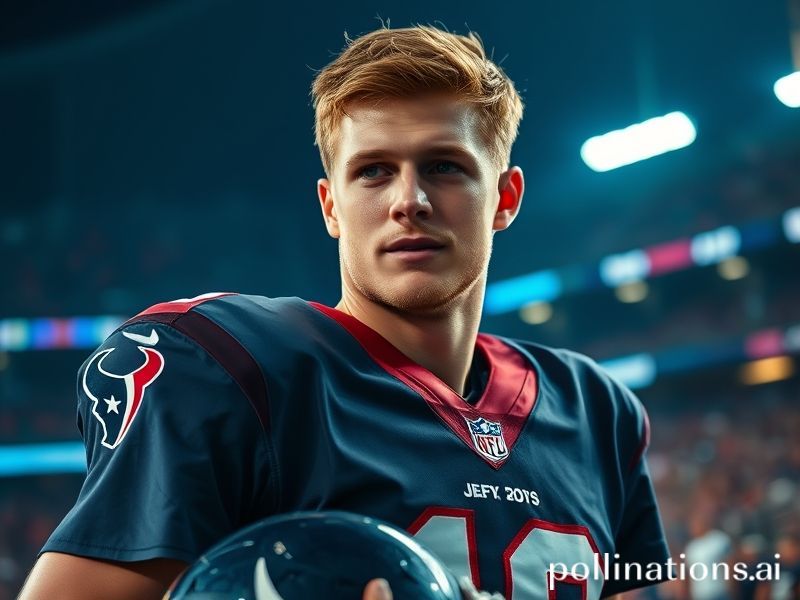jeff driskel
Jeff Driskel and the Curious Case of the Disposable Quarterback
By Our Man in the Cheap Seats, somewhere over the North Atlantic
If the American experiment in late-stage capitalism had a mascot, it might well be Jeff Driskel—an itinerant quarterback whose career arc resembles a Ryanair flight plan: cheap, indirect, and perpetually delayed. The 31-year-old Floridian has now logged stints with seven NFL teams, two XFL outfits, and—just to keep the passport interesting—the USFL’s Houston Gamblers. Wherever the globe’s most profitable sports league needs a warm arm that can spell the starter for three merciful quarters, Driskel appears like a well-compensated Uber driver: “Need a ride to 0-3? I’m five minutes away.”
The international significance here is not, strictly speaking, about football. It’s about the export of a uniquely American notion: the replaceable human widget. While European football clubs still treat backup goalkeepers like eccentric uncles—young Dearden who once saved three penalties in ’09 and therefore owns a pub in Leeds—the NFL has perfected a supply chain of quarterbacks who can be swapped out faster than an iPhone battery. Driskel embodies this just-in-time philosophy. He’s the Alibaba of second-stringers: reliable shipping, questionable quality, arrives in bulk.
Consider the geopolitical backdrop. As the U.S. frantically re-shores microchips and Europe re-shores energy, the NFL quietly off-shores disappointment. Driskel’s 2023 detour to the XFL’s Seattle Sea Dragons coincided with America’s broader retreat from globalization; even our failures are being insourced. The league needs a domestic reservoir of mediocrity to stock emergency rosters, lest some enterprising CFL import demand universal healthcare. Driskel, ever the patriot, obliged—accepting the league-minimum $59,000 for a spring gig that ended with a torn MCL and a commemorative keychain.
This is where dark humor sharpens its teeth. In most countries, a 31-year-old with a decade of elite experience would be mentoring teenagers, sipping espresso, perhaps teaching gym. In the NFL ecosystem, Driskel is a “developmental project”—a phrase that translates roughly to “still breathing.” The league’s analytics departments have reduced human potential to a Monte Carlo simulation; Driskel’s ceiling is the basement of someone else’s house. He is the football equivalent of a Ukrainian grain shipment: valuable only when the usual channels collapse.
Meanwhile, the world watches, bemused. Chinese netizens on Weibo compare Driskel to “diplomatic small talk”—present, polite, forgotten by dessert. Latin American sportswriters invoke him when explaining why their baseball academies still bother teaching curveballs instead of exit velocity: at least a lefty reliever can carve out ten years in the majors without being cut for a TikTok star. In short, Driskel has become a transcontinental cautionary tale: specialize narrowly, travel widely, retire anonymously.
Yet there is dignity in the absurd. Driskel’s latest gig—third on the depth chart in Washington—pays more per inactive Sunday than a Bolivian lithium miner earns in a year. Somewhere in La Paz, a 19-year-old scrolling NFL highlights must reconcile the cosmic injustice: mine cobalt so Americans can stream a man holding a tablet. Driskel, blissfully unaware, spends Tuesday mornings practicing handoffs to ghosts, his greatest contribution to society being the faint hope that he never actually plays.
This is the broader significance of the Disposable Quarterback: he is the mirror in which late capitalism contemplates its own mortality. We cheer the starter, fetishize the rookie, and ignore the journeyman—until we need him. Then we demand miracles from a man whose greatest skill is memorizing playbooks faster than he loses jobs. The international takeaway? In the global marketplace of human endeavor, most of us are Jeff Driskel: competent enough to remain on call, irrelevant enough to remain invisible.
And so, somewhere between a Redskins jersey that says “Commanders” and a Houston Gamblers shirt already on eBay, Jeff Driskel endures. Not as hero, not as villain, but as living proof that the American dream is alive—provided you’re comfortable being woken up every six weeks and told to pack.







